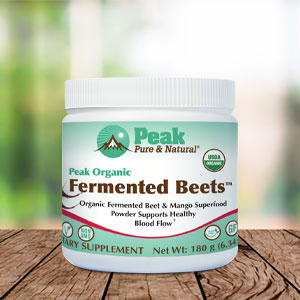Get Easy Health Digest™ in your inbox and don’t miss a thing when you subscribe today. Plus, get the free bonus report, Mother Nature’s Tips, Tricks and Remedies for Cholesterol, Blood Pressure & Blood Sugar as my way of saying welcome to the community!
When surgery won’t save you from a heart attack (but what could ‘beet’ it)

Heart procedures like angioplasties and bypass operations save lives. Just think about it…
If (God forbid) you ever have a massive heart attack, don’t you hope there’s a top-notch cardiothoracic surgeon waiting in the O.R. to quickly open your blocked artery through a bypass or angioplasty?
I do. But you know the old adage “too much of a good thing?” Well, it applies to lifesaving procedures like these too.
Because the fact is, tens of thousands of people get these procedures preventatively. They have heart disease. But it’s stable. Their cardiologists recommend these procedures to prevent them from having a heart attack in the future.
The downside to preventative heart procedures? These procedures come with major risks. In fact, here’s the biggest reason not to get them when you have stable heart disease…
A new study shows they probably won’t prevent you from having a heart attack. In fact, they could make your heart attack risk worse.
Heart procedures don’t reduce heart attack risk if you have stable heart disease
A lot of Americans (17 million or so) have clogged arteries that are cutting off blood supply to their hearts. This causes chest pain and could eventually lead to a heart attack. But a recent trial shows why they probably shouldn’t turn to heart procedures for prevention.
The federal government spent $100 million dollars on a study that included 5,179 people from 37 countries. Here’s what they found…
Having heart procedures didn’t reduce the risk of heart attacks compared to less invasive treatments like drugs and lifestyle changes.
People in the trial had severe but stable heart disease. Half were given an invasive procedure, like angioplasty (which most often included a stent too) and bypass operations. The other half just used medications and lifestyle changes to manage their heart disease. Doctors then tracked study participants for major heart events like heart attacks, heart-related deaths, cardiac arrest or hospitalization for worsening chest pain or heart failure.
After the first year, seven percent of the people who received the heart procedures experienced one of these events. Guess how many people in the drug/lifestyle treatment group had them? Five percent.
Now, after four years the tables turned. Thirteen percent of people who got procedures experienced serious heart events and fifteen percent of people in the drugs/lifestyle group did. Basically, it became a wash. The risk evened out, and researchers went away with a clear message…
Heart procedures don’t seem to help people with stable heart disease avoid heart attacks more than drugs and lifestyle changes do.
They do, however, reduce chest pain more than drugs and lifestyle changes do. So they may still be worthwhile for people with stable heart disease who have serious heart pain.
The trifecta that manages stable heart disease: Diet, exercise and drugs
Heart disease is a very serious condition… even if it’s stable. But you should think twice before undergoing a heart procedure. Unless you have frequent heart pain that’s ruining your quality of life, procedures like angioplasties and bypass operations probably have more risks than benefits.
What should you do instead?
Rely on the safest, most effective trifecta of treatments for stable heart disease: diet, exercise, and, if necessary, drugs.
There are a variety of drugs that can reduce your risk of having a heart attack when you have stable heart disease. Cardiologists recommend everything from aspirin to cholesterol-lowering drugs to blood pressure medicines.
If you’re not yet on medications, you may be able to keep it that way if you eat the right foods…
Research shows the best diet for heart health is probably the Mediterranean diet. In fact, a 2017 study found that a low-carb Mediterranean diet can reduce hidden fat deposits around the heart that contribute to heart disease.
But not only will a Mediterranean-styled diet help you avoid unhealthy fats that contribute to deposits around your heart and in your arteries, you’ll have less insulin (fewer blood sugar spikes) in your bloodstream and more nitric oxide (NO) for better blood flow.
The Mediterranean diet provides L-arginine (from fish, nuts, legumes, and unrefined grains) and nitrate (green leafy vegetables), which serve as precursors to help the body produce NO which acts as a natural vasodilator, to allow blood to flow freely.
If you find it hard to get all those foods regularly, simply eating beets or beet powder will do the trick. In fact, beets can help produce NO faster and more efficiently in the body.
As far as exercise goes, take it slow and steady if you have stable heart disease. Don’t be afraid to exercise, but discuss possible limitations with your cardiologist.
Work your heart without working it too hard. Choose light aerobic activities like walking, swimming, gentle jogging or biking. And when you do exercise, watch for signs you exercised too hard, like:
- Dizziness or lightheadedness
- Chest pain
- Irregular heartbeat or pulse
- Shortness of breath
- Nausea
Editor’s note: There are perfectly safe and natural ways to decrease your risk of blood clots including the 25-cent vitamin, the nutrient that acts as a natural blood thinner and the powerful herb that helps clear plaque. To discover these and other secrets of long-lived hearts, click here for Hushed Up Natural Heart Cures and Common Misconceptions of Popular Heart Treatments!
Sources:
- Big study casts doubt on need for many heart procedures — MedicalXpress
- Study casts doubt on angioplasty, bypass for many heart patients — MedicalXpress
- Best Heart-Healthy Diets — U.S. News & World Report
- Being active when you have heart disease — MedlinePlus














